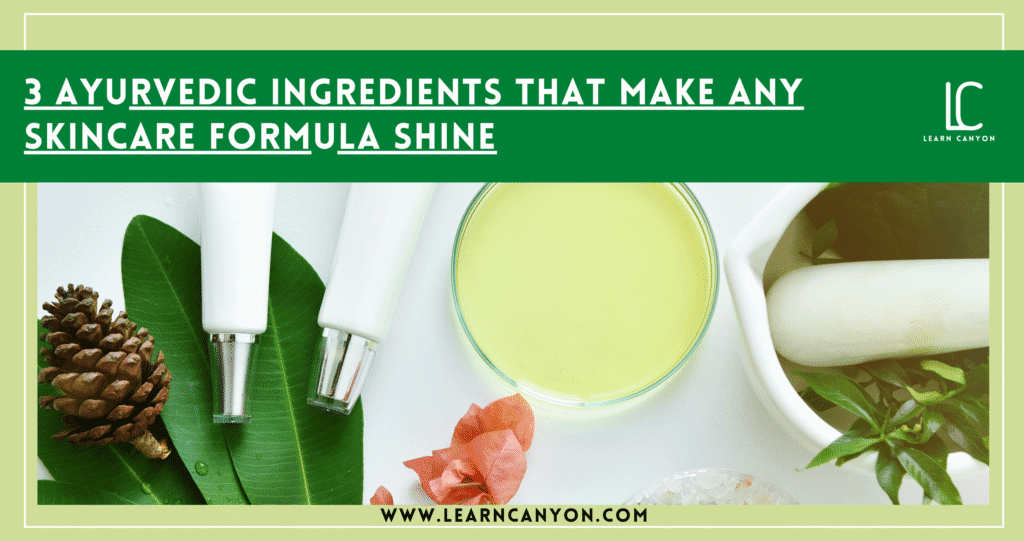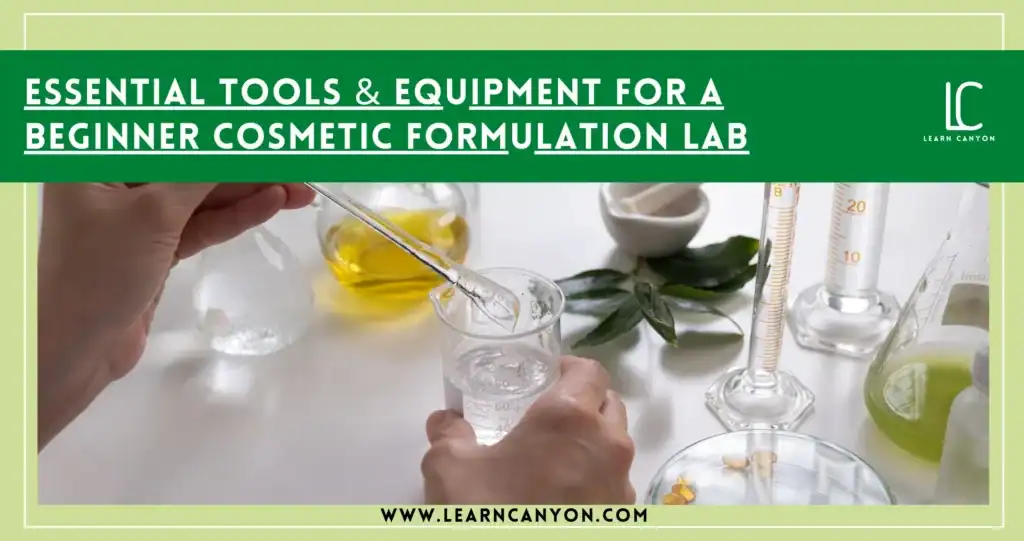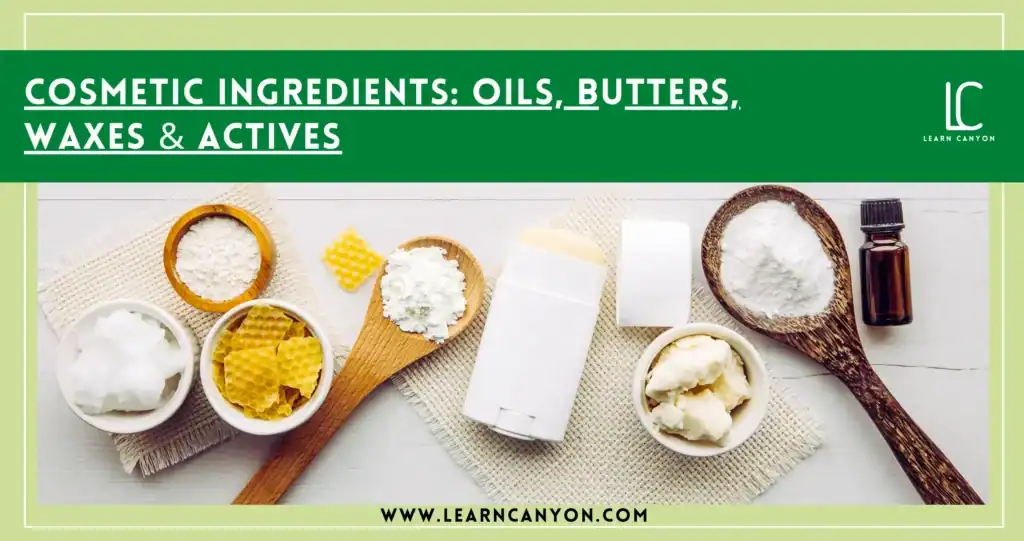Let’s be honest, in today’s beauty world, we’re constantly bombarded with the “next big thing.” Peptides, retinoids, niacinamide… the list goes on. And while I absolutely love exploring the latest in cosmetic chemistry (you know I do!), there’s something incredibly grounding about returning to the roots. Quite literally.
Ayurveda, the 5,000-year-old science of life, is a treasure chest of botanical brilliance. Passed down through generations, it holds deep skin wisdom that’s stood the test of time. And no, it’s not just about mixing a few herbs in a bowl and hoping for the best. As a professional formulator who blends tradition with technique, I can tell you: Ayurvedic ingredients have the power to transform your skincare if you truly understand how to work with them.
In this blog, I’m spotlighting three Ayurvedic superstars that deserve a permanent spot in your formulation lineup. Whether you’re crafting a gentle serum, a glow-enhancing cream, or a soothing face mask, these ingredients can elevate your formulas and connect you (and your customers) with something far deeper than surface-level beauty.
Ready to meet them? Let’s dive in.
What Makes an Ayurvedic Ingredient Special?
Now you might be wondering, what really sets Ayurvedic ingredients apart from the rest of the plant-based crowd? I get this question all the time from my students and fellow formulators. And here’s the truth: it’s not just about the herb itself, it’s about the philosophy behind how and why it’s used.
In Ayurveda, every ingredient is chosen with deep intention. We’re not just looking at a single benefit like “anti-inflammatory” or “brightening.” We’re looking at energetics, how that plant interacts with your skin, your dosha, your lifestyle, and even the seasons. Ayurvedic ingredients are deeply intelligent. They don’t just fix a symptom; they work on balance, harmony, and long-term transformation.
And from a modern formulation lens? These herbs are multifunctional powerhouses. Take Manjistha, it’s not just a pretty red powder. It’s a lymphatic cleanser, a natural pigment, and a brightening agent all rolled into one. Or Gotu Kola, which boosts collagen and soothes sensitivity in a way that’s incredibly gentle yet effective.
When you blend Ayurvedic wisdom with modern formulation techniques, proper extraction, pH control, synergistic actives, that’s when the magic really happens. You get results backed by both tradition and science. And that, my friend, is what makes Ayurvedic ingredients so incredibly special in skincare.
Ingredient #1: Gotu Kola – The Collagen Booster
If there’s one Ayurvedic herb I could put in every anti-aging formula, it’s Gotu Kola. Known as Mandukaparni in Sanskrit, this delicate little leaf may look humble, but it’s a powerhouse when it comes to skin regeneration.
Gotu Kola is packed with triterpenoids, active compounds that help stimulate collagen synthesis and improve skin elasticity. But what I love most as a formulator? It does all this without irritating the skin. So, whether you’re working on a sensitive skin serum, an eye contour cream, or even a post-sun recovery gel, Gotu Kola fits right in like that friend who’s always welcome.
Traditionally, it’s been used to heal wounds and calm inflamed skin, which tells us a lot about its soothing properties. But when used properly in modern formulations, say, as a water-based extract, hydroglycerite, or even infused into a light botanical oil, it becomes a gentle yet effective collagen-booster that helps reduce fine lines and repair the skin barrier.
Pro Tip: I often pair Gotu Kola with panthenol or low molecular weight hyaluronic acid in serums. Together, they hydrate, soothe, and firm the skin beautifully.
It’s one of those herbs that quietly does its job, no drama, just results. And that’s what makes it shine in any formulation designed for resilience, radiance, and repair.

Ingredient #2: Manjistha – The Skin Tone Equalizer
Ah, Manjistha, just saying the name feels powerful, doesn’t it? This rich, red root is one of Ayurveda’s most revered herbs for skin, and for good reason. Traditionally used to purify the blood and support the lymphatic system, Manjistha (Rubia cordifolia) has long been celebrated for giving the skin that even, lit-from-within glow.
From a modern formulation perspective, Manjistha is a game-changer when it comes to dull, uneven skin tone, acne scars, and pigmentation. It’s anti-inflammatory, antioxidant, and incredibly effective at calming redness while promoting clarity. What I personally love about it is how beautifully it works for both oily/acne-prone skin and mature, tired skin that’s lost its luster.
Now, as a formulator, you can use Manjistha in a few creative ways:
- In powdered form, it works beautifully in masks and scrubs.
- As an oil infusion, it lends both color and actives to facial oils or balms.
- In water-based decoctions, it can be incorporated into toners or emulsions.
Pro Tip: Try combining Manjistha with licorice root and turmeric in a balancing face mask, it’s a trifecta for brightening, calming, and detoxifying.
It’s one of those herbs that works quietly behind the scenes, evening out the skin tone, fading the scars of the past (literally), and bringing skin back into harmony. No wonder the ancient texts call it “varna vardhini”, the one who enhances complexion.

Ingredient #3: Licorice Root – The Natural Brightener
If your goal is radiant, even-toned, happy skin, Licorice Root is your best friend. Known in Ayurveda as Yashtimadhu, this sweet and soothing root has been used for centuries to calm the skin, lighten discoloration, and bring a healthy glow to dull complexions.
What makes Licorice Root such a standout in modern skincare? One word: Glabridin. It’s a powerful compound that inhibits tyrosinase, the enzyme responsible for melanin production, which means it’s incredibly effective at tackling hyperpigmentation, dark spots, and uneven skin tone. And unlike harsher brightening agents, it does this gently, without triggering irritation.
As a formulator, I adore how versatile it is. You can work with it as:
- A water-soluble extract in serums and toners
- A glycerite for soothing gels and hydrating lotions
- An infused oil that brings calm to barrier-repair balms or creams
Pro Tip: Pair Licorice Root with niacinamide and oat beta-glucan for a calming and brightening duo that’s perfect for sensitive skin prone to redness or dullness.
And let’s not forget its anti-inflammatory and antioxidant benefits, it helps reduce irritation, soothe breakouts, and protect against environmental stressors. It’s a true multitasker that delivers visible results without compromising the skin’s integrity.In Ayurveda, Yashtimadhu is considered a rasayana, a rejuvenator. And in your formulations, it lives up to that name beautifully.

Formulation Tips:
Alright, now that we’ve fallen in love with Gotu Kola, Manjistha, and Licorice Root, let’s talk about the real magic: how to actually work with them in your formulations so they shine like they’re meant to.
Because here’s the truth, even the most powerful herb won’t deliver results if it’s not extracted, preserved, or paired correctly. Ayurveda gives us the what and why, but formulation science gives us the how. And blending the two? That’s where you become a true alchemist.
1. Choose the right extraction method
Water-soluble actives like those in Licorice and Gotu Kola love to be in the aqueous phase, think hydrosols, decoctions, glycerites. Oil infusions are best for fat-soluble compounds and when you want a slow, gentle release of actives, perfect for Manjistha in balm textures.
2. Know your pH sweet spot
Most Ayurvedic extracts prefer a mildly acidic environment, around pH 5-6, to stay stable and active. Always check the pH after combining with other actives or surfactants, especially in emulsions and toners.
3. Pair wisely for synergy
Gotu Kola and Panthenol are a dream team for barrier repair. Licorice and Niacinamide? Skin-brightening soulmates. And Manjistha with turmeric or aloe? A clarifying, calming combo that’s hard to beat. Let your ingredients support each other.
4. Protect your actives
Use opaque or UV-protected packaging if your formula contains botanical extracts prone to oxidation. Consider antioxidants like Vitamin E or rosemary extract in oil-based formulas to extend shelf life.
5. Less is often more
With Ayurvedic actives, it’s not about high percentages, it’s about the whole plant synergy. Even at 1–3%, these ingredients can transform a formula when used correctly.
Priya’s Tip: Always test your extracts in small batches first. Herbal materials can vary from supplier to supplier, and even season to season. Get to know their personality before committing them to your hero product.
Remember, these herbs have been healing skin for thousands of years. When you handle them with intention, patience, and a bit of formulation finesse, they’ll do exactly what they’ve always done: bring the skin back into balance.
Priya’s Pick: Sample Herbal-Infused Serum Formula
Let’s turn theory into practice, shall we? If you’ve ever wanted to create a serum that feels luxurious, looks professional, and truly delivers results, here’s a formula straight from my own Ayurvedic-meets-modern playbook.
This herbal-infused serum is designed to brighten, soothe, and support collagen, a lightweight, water-based serum that works beautifully as a daily skin ritual for all skin types, especially those dealing with pigmentation, dullness, or early signs of aging.
Radiance Revival Herbal Serum
Phase A – Water Phase
- Distilled Water – Qs%
- Gotu Kola Extract (water-soluble) – 5%
- Licorice Root Glycerite – 4%
- Manjistha Decoction – 10%
- Sodium Hyaluronate (LMW) – 0.5%
- Panthenol (Provitamin B5) – 2%
Phase B – Active + Functional
- Niacinamide – 4%
- Propanediol – 3% (for enhanced penetration)
- Allantoin – 0.5%
- Preservative (EcoCert approved, like Geogard Ultra or Euxyl K903) – 1%
- Chelator (e.g., Sodium Phytate) – 0.1%
Phase C – Finishing Touches
- Aloe Vera Juice (powder reconstituted or pure) – 6.9%
- Essential Oil (optional: Lavender or Frankincense) – 0.1%
Formulation Notes:
- Combine Phase A ingredients and gently stir until fully dissolved.
- Add Phase B ingredients one by one, checking for full dissolution, especially with niacinamide.
- Finish with Phase C ingredients and adjust pH to 5.0–5.5.
- Bottle in a UV-protective pump or glass dropper.
This formula sinks into the skin like a dream, no stickiness, no pilling. It gives a soft, dewy glow while working behind the scenes to restore balance and clarity. And the best part? It tells a story, of roots, rituals, and radiant skin.
Priya’s Pro Tip: Always label and date your test batches. Let it sit for 1–2 weeks before evaluating stability, especially when working with fresh decoctions or herbal extracts.
Conclusion
At the end of the day, formulation is more than just measuring and mixing, it’s storytelling through ingredients. And Ayurveda? It gives us some of the richest, most beautiful stories to tell.
When you bring Ayurvedic botanicals like Gotu Kola, Manjistha, and Licorice Root into your lab, you’re not just adding “natural ingredients.” You’re adding layers of tradition, energetics, and purpose. And when you pair that with modern formulation science? That’s where the magic really happens.
You get skincare that isn’t just clean, it’s intelligent. Products that don’t just sit on the skin but interact with it. Support it. Heal it. And elevate it.
So, whether you’re formulating for your own brand, your clients, or just exploring the world of conscious beauty, I invite you to embrace the wisdom of Ayurveda not as an alternative, but as a powerful companion to innovation.
Because that’s the kind of beauty the world needs more of.











